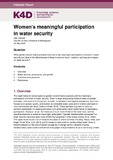| dc.contributor.author | Herbert, Sian | |
| dc.date.accessioned | 2022-06-14T12:01:09Z | |
| dc.date.available | 2022-06-14T12:01:09Z | |
| dc.date.issued | 2022-05-20 | |
| dc.identifier.citation | Herbert, S. (2022). Women’s Meaningful Participation in Water Security . K4D Helpdesk Report. Institute of Development Studies. DOI:10.19088/K4D.2022.063 | en |
| dc.identifier.uri | https://opendocs.ids.ac.uk/opendocs/handle/20.500.12413/17467 | |
| dc.description.abstract | This rapid literature review explores gender transformative practices and the meaningful participation of women in water security. There is large and growing literature base on gender and water, with most of it coming from a health, or sanitation and hygiene perspective, and most focussing on access, quality, and women as vulnerable water users and or women and water in rural communities (de Silva, Veilleux & Neal, 2018). There has been a growth in focus on women’s participation in water governance, and particularly a more recent focus on meaningful participation. However, as yet, the literature is much more limited in this latter area, and the practical advances in women’s meaningful participation (“gender transformative processes”) in water security have also been more limited than progress in other areas (Ozano, et al., 2022). This rapid review found a lot of literature focusses on a few countries including: Kenya, India, and Nepal. As de Silva, et al. (2018, p.212) explain in their work on transboundary water, there is limited evidence on “the role of women as agents of change within a decision-making, transboundary water context and almost every paper that promised to do so in some way, ended up focusing on specific developing countries and women as direct water users”. As for the effectiveness of certain practices over others, and over different timeframes, there is little empirical information on this, yet there are a lot of critical reflections in the literature on the broad barriers to meaningful participation. And there are general recommendations for how to make progress on this agenda. This rapid review is indicative of the most commonly discussed issues in the literature, but is not inclusive of all of the many related issues. | en |
| dc.description.sponsorship | FCDO (Foreign, Commonwealth and Development Office) | en |
| dc.language.iso | en | en |
| dc.publisher | Institute of Development Studies | en |
| dc.relation.ispartofseries | K4D Helpdesk Report;1159 | |
| dc.rights.uri | https://www.nationalarchives.gov.uk/doc/open-government-licence/version/3/ | en |
| dc.subject | Environment | en |
| dc.subject | Gender | en |
| dc.subject | Water | en |
| dc.title | Women’s Meaningful Participation in Water Security | en |
| dc.type | Helpdesk | en |
| dc.rights.holder | © Crown copyright 2022 | en |
| dc.identifier.doi | 10.19088/K4D.2022.063 | |
| dcterms.dateAccepted | 2022-05-20 | |
| rioxxterms.funder | Default funder | en |
| rioxxterms.identifier.project | K4D | en |
| rioxxterms.version | VoR | en |
| rioxxterms.versionofrecord | 10.19088/K4D.2022.063 | en |
| rioxxterms.funder.project | 0986883a-6d0f-4bb8-9c46-5e0682934d65 | en |

